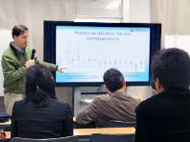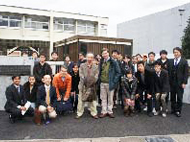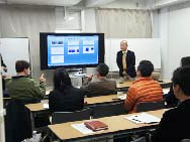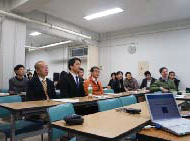Events
GCOE Young Researcher Seminar "Seminar on Occurrence and Management on Emerging Contaminants in Japan and UK"
Date: Dec.3, 2011
Venue: RCEQM Seminar Room 1-2 Yumihama, Otsu, Shiga, Japan
Organized by:
- Kyoto University Global COE Program "Global Centre for Education and Research on human Security Engineering for Asian Megacities"
Co-organized by:
- Research Center for Environmental Quality Management
- Support Program for Improving Graduate School Education “Int’tech Fusion Graduate School Engineering Education Program”
Number of attendants: 31
Program
Report 179
Introduction
The GCOE-HSE Kyoto University and the RCEQM were co-hosting a seminar on “Occurrence and Management of Emerging Contaminants in Japan and UK” to gain a better understanding of environmental research in two representative continents of Asia and Europe. The purpose of this seminar was to discuss and share experience, issues and challenges in implementing environmental practices to the next generation researcher. Dr. Andrew C. Johnson from Centre for Ecology & Hydrology Wallingford, UK and Assoc. Prof. Hiromoto Koshikawa from Ryukoku University, Japan were kindly invited to share their expertise in the seminar. To enrich the discussion, several case studies were being prepared to share the environmental issues related with emerging contaminants in water environment.
At the opening of the seminar, Prof. Hiroaki Tanaka Introduced the RCEQM and highlighted the objectives of the seminar.
Report
The seminar was divided into 3 main sessions. A total of 10 presentations were made in the seminar. In the first session, Dr. Andrew C. Johnson presented about the CEH research on international exposures to chemicals, nanosilver and a new endocrine disruption story. He insisted that the accurate background information is critical for effective management of nano-particles and other emerging contaminants, but is generally lacking. A new story about the natural and synthetic progesterone was introduced in this seminar. As the pharmaceuticals (antibiotics) begins to observe large proportion of wastewater and river water, the water sector is confronted with the challenge of antibiotic resistant bacteria, either by human body into the wastewater system or through wastewater to river water, demonstrated by Assoc. Hiromoto Koshikawa. Dr. Yoon, Dr. Ihara and other students presented their own studies to address the complexity of environmental problems.
Finally, Prof. Tanaka concluded that the case studies presented in the seminar raised some questions about the appropriate management approaches to deal with emerging contaminants in terms of effectiveness, while at the same time responding to the essential need to sustainable development. The Seminar participants agreed that the proper management (through the various kind of advanced water treatment system) of emerging contaminants will be an increasingly important part of the sustainable environmental development in the future and not only in the education sector. We remain truly grateful to all the presenters and participants for their joint efforts.




